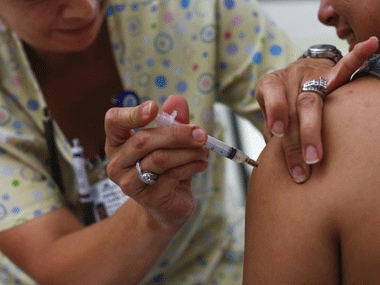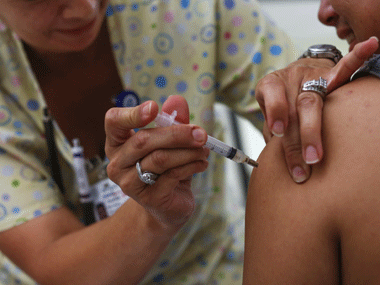Washington: A new human papillomavirus (HPV) vaccine can potentially prevent 80 percent of cervical cancers if given to all 11 or 12-year-old children before they are exposed to the virus, says a US-based study. A common sexually transmitted infection, HPV can spread through vaginal, anal, or oral sex with someone who has the virus. [caption id=“attachment_2239920” align=“alignleft” width=“380”] Representational image. Reuters[/caption] In addition to protecting against 80 percent of cervical cancers, the new 9-Valent HPV vaccine, which includes seven cancer causing HPV-types, has the potential to protect against nearly 19,000 other cancers, including anal, oropharyngeal and penile cancers, the researchers noted. This is a 13 percent increase in protection against HPV-related cancers considering that Gardasil and Cervarix, the first vaccines made available in the market protected only against HPV types 16 and 18. “This is the first comprehensive study of its kind which shows the potential to not only reduce the global cancer burden, but also guide clinical decision-making with regard to childhood vaccinations,” said senior author of the study Marc Goodman of Cedars-Sinai Samuel Oschin Comprehensive Cancer Institute. The US Centers for Disease Control and Prevention initiated the research effort in conjunction with Cedars-Sinai Medical Centre in California. The study found that the 9-Valent vaccine, under the trademark of Gardasil-9, also has the potential to protect against an additional eight percent of oropharyngeal cancers, which include the base of the tongue and tonsils. This disease is the second-most-common HPV-associated cancer. To compile these data, researchers examined 2,670 HPV DNA tissue samples from seven population-based cancer registries. The study was published in the Journal of the National Cancer Institute. IANS
Representational image. Reuters[/caption] In addition to protecting against 80 percent of cervical cancers, the new 9-Valent HPV vaccine, which includes seven cancer causing HPV-types, has the potential to protect against nearly 19,000 other cancers, including anal, oropharyngeal and penile cancers, the researchers noted. This is a 13 percent increase in protection against HPV-related cancers considering that Gardasil and Cervarix, the first vaccines made available in the market protected only against HPV types 16 and 18. “This is the first comprehensive study of its kind which shows the potential to not only reduce the global cancer burden, but also guide clinical decision-making with regard to childhood vaccinations,” said senior author of the study Marc Goodman of Cedars-Sinai Samuel Oschin Comprehensive Cancer Institute. The US Centers for Disease Control and Prevention initiated the research effort in conjunction with Cedars-Sinai Medical Centre in California. The study found that the 9-Valent vaccine, under the trademark of Gardasil-9, also has the potential to protect against an additional eight percent of oropharyngeal cancers, which include the base of the tongue and tonsils. This disease is the second-most-common HPV-associated cancer. To compile these data, researchers examined 2,670 HPV DNA tissue samples from seven population-based cancer registries. The study was published in the Journal of the National Cancer Institute. IANS
US study throws up new vaccine to prevent cervical cancer
FP Archives
• May 12, 2015, 14:11:41 IST
A new human papillomavirus (HPV) vaccine can potentially prevent 80 percent of cervical cancers if given to all 11- or 12-year-old children
Advertisement
)